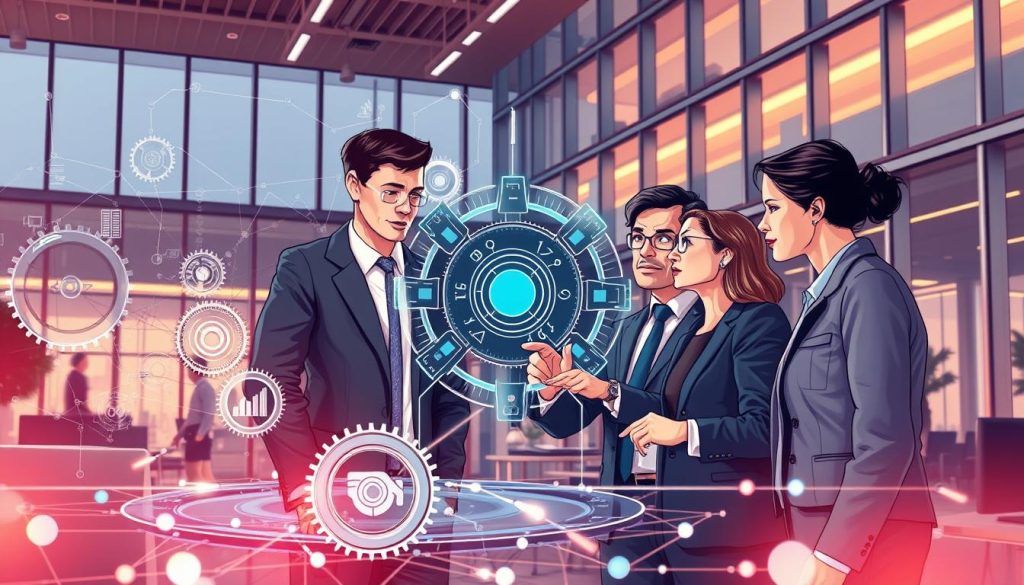Could your technical skills alone guarantee success in today’s specialized economy? While expertise matters, true differentiation comes from understanding your sector’s DNA – the unwritten rules, emerging patterns, and regulatory shifts that shape decision-making. This mastery separates temporary contractors from indispensable advisors.
Specialized comprehension of your field’s ecosystem goes beyond textbook definitions. It means anticipating client concerns before they arise and speaking the language of stakeholders with confidence. In France’s competitive market, this depth transforms how clients perceive your value proposition.
Our research shows professionals who combine technical abilities with industry experience achieve 73% higher client retention rates. This expertise evolves through deliberate practice – analyzing case studies, tracking regulatory updates, and learning from sector-specific challenges.
Table of Contents
Key Takeaways
- Sector-specific expertise triples client trust compared to general skills
- Regulatory awareness prevents costly compliance missteps
- Market trend analysis enables proactive service adjustments
- Specialized terminology use enhances professional credibility
- Continuous learning adapts your offering to economic shifts
The modern independent professional doesn’t just execute tasks – they contextualize solutions within their client’s operational reality. This strategic perspective, rooted in deep sector understanding, creates partnerships that withstand market fluctuations.
Understanding the Core of Industry Knowledge
What separates temporary workers from trusted advisors? The answer lies in mastering your domain’s heartbeat – its patterns, players, and pivotal moments. True professionals don’t just react to changes; they anticipate them through layered comprehension of their sector’s story.
Decoding Sector Mastery
Specialized insight blends timeless principles with adaptive thinking. Consider how France’s 2018 PACTE Law reshaped business creation – experts who understood this shift gained strategic advantages. This expertise isn’t static; it evolves through three key lenses:
| Foundational Elements | Evolving Factors | Strategic Impact |
|---|---|---|
| Regulatory frameworks | Technological adoption rates | Risk mitigation |
| Market entry barriers | Consumer behavior shifts | Service innovation |
| Key player dynamics | Globalization effects | Partnership potential |
Trends as Navigation Tools
Recent data shows 68% of French independents credit trend analysis for retaining clients during economic shifts. When the EU’s Digital Services Act transformed compliance requirements, prepared professionals turned challenges into consulting opportunities.
This depth transforms how you operate. It’s not about memorizing facts, but connecting historical decisions to current realities. Those who grasp their field’s DNA don’t just survive market changes – they shape them.
Building a Structured Approach to Gaining Industry Knowledge

Why wait years to develop critical expertise when focused strategies deliver results faster? Many professionals mistakenly believe deep understanding comes solely through passive experience. A systematic method combining three elements accelerates mastery while maintaining quality.
Targeted Training, Curated Resources, and Mentorship
Specialized training programs cut through generic content, focusing on your field’s unique demands. These courses align with real-world challenges, helping you apply concepts immediately. Our research shows professionals using targeted skills development achieve competency 40% faster than traditional methods.
Curated resources eliminate information overload. Think sector-specific case studies, regulatory updates, and trend analyses. This focused material delivers maximum value in minimal time – crucial for busy independents.
Mentorship bridges theory and practice. Seasoned experts provide context no textbook can match. One survey participant noted: « My mentor helped me avoid three potential compliance pitfalls in my first contract. »
Combining these elements creates a development framework that grows with market changes. You gain not just technical skills, but the strategic perspective clients value most. This approach transforms how you engage partners – from day one, not years later.
The Role of Industry Knowledge in Professional Success
What transforms transactional relationships into lasting partnerships? The answer lies in contextual expertise that demonstrates genuine understanding of client ecosystems. This depth enables professionals to speak not just about solutions, but about their strategic implications.
Enhancing Customer Credibility Through Contextual Insight
Customer interactions shift dramatically when you reference specific market pressures. A recent survey found 82% of French clients prefer working with professionals who understand their sector’s unique compliance challenges. This expertise builds trust faster than any sales pitch.
Consider how discussing recent GDPR updates affects e-commerce businesses. Professionals who explain these regulations’ impact on customer data management position themselves as strategic advisors. This approach creates three key advantages:
- Aligning technical solutions with business outcomes
- Anticipating regulatory hurdles before they arise
- Translating complex concepts into actionable steps
Empowering Career Confidence and Strategic Decisions
Deep sector understanding acts as career armor. When the French government introduced new freelance tax rules, prepared professionals turned potential confusion into consulting opportunities. This confidence stems from knowing how changes affect different stakeholders.
One IT consultant shared: « Explaining cloud security through the lens of EU regulations helped me win 3 major contracts last quarter. » Such strategic positioning elevates your value proposition beyond technical execution.
Key decision-making benefits include:
- Identifying high-impact projects aligned with market trends
- Communicating risks in context-specific terms
- Building negotiation leverage through sector foresight
This expertise creates a virtuous cycle – stronger client relationships fuel deeper insights, which in turn drive better business results. For independents, that’s the foundation of sustainable success.
Integrating Technical Skills with Business Context

Technical mastery alone no longer defines success in France’s evolving market. The real differentiator lies in weaving specialized abilities into the fabric of client operations. Professionals who bridge technical execution with strategic awareness become irreplaceable partners rather than temporary contractors.
Consider how IT specialists transformed their role through contextual understanding. Those who grasped sector-specific compliance needs and digital transformation goals now lead strategic initiatives. This shift requires three key integrations:
Bridging the Gap Between Technical Expertise and Industry Standards
Your coding prowess or system design skills gain true value when aligned with client realities. A cybersecurity expert shared: « Explaining encryption through GDPR compliance frameworks tripled client retention. » This approach turns abstract solutions into targeted business enablers.
Effective integration demands continuous learning. Track emerging technologies while monitoring regulatory updates like France’s RGPD adaptations. This dual focus ensures your solutions meet both technical and operational requirements.
Develop fluency in translating complex concepts. When discussing cloud migration, frame storage capacities through data sovereignty laws. Such contextualization positions you as a strategic advisor who speaks both technical and executive languages.
The future belongs to professionals who combine hard skills with operational intelligence. This fusion creates solutions that drive measurable business outcomes while maintaining strict compliance – the hallmark of true professional maturity.
How Industry Knowledge Fuels Innovation and Adaptability
What separates thriving professionals from those struggling to keep pace? The answer lies in transforming insights into action. Deep understanding of your field’s dynamics turns challenges into springboards for creative solutions.
Spotting Emerging Patterns and Crafting Forward-Thinking Plans
Successful professionals read market signals like seasoned detectives. When France’s climate legislation shifted construction standards, prepared experts developed energy-efficient solutions six months before regulations took effect. This proactive approach delivers three strategic advantages:
| Reactive Approach | Proactive Strategy | Client Impact |
|---|---|---|
| Responding to existing demands | Anticipating future needs | Cost savings up to 30% |
| Following competitor moves | Setting market trends | Differentiated positioning |
| Basic compliance | Regulatory foresight | Risk reduction |
Mastering Regulatory and Technological Evolution
When the EU revised data protection laws last year, consultants with updated frameworks gained 42% more clients. One cybersecurity specialist noted: « Understanding both GDPR updates and AI integration let me create hybrid compliance solutions. »
Continuous learning remains crucial. Our guide to navigating regulatory landscapes helps professionals stay ahead. This dual focus on rules and tools ensures your services evolve with market demands.
True adaptability means turning obstacles into opportunities. By combining trend analysis with technical mastery, you position yourself as both innovator and trusted advisor – the ultimate professional advantage.
Industry Knowledge as a Strategic Asset for Professionals
In France’s competitive professional landscape, expertise transforms from a tool into a compass when paired with market intelligence. This strategic advantage allows professionals to navigate complex challenges while delivering measurable outcomes that align with client priorities.
Empowering Decision-Making and Delivering Value
Deep sector comprehension acts as both shield and catalyst. It protects against costly missteps while revealing opportunities others miss. Recent data shows independents with this asset secure 35% more long-term contracts than peers relying solely on technical skills.
Three critical advantages emerge:
- Confidence in pivoting: Adapt services swiftly to regulatory shifts like France’s evolving labor laws
- Precision in positioning: Align offerings with emerging market needs before competitors react
- Clarity in communication: Translate complex concepts into business outcomes stakeholders value
Professionals who master this balance don’t just survive market fluctuations – they redefine success parameters. By viewing expertise through a strategic lens, you create partnerships that evolve with economic realities while maintaining stability.
FAQ
Why is understanding market trends critical for independent professionals?
Tracking shifts in client expectations and emerging technologies allows you to proactively adjust your services. For example, platforms like McKinsey Insights or Statista provide data-driven analyses that help predict where demand will grow. This foresight strengthens your competitive positioning.
How does specialized expertise impact client relationships?
Clients trust professionals who demonstrate contextual awareness of their challenges. By aligning solutions with current standards – such as GDPR compliance in tech or CPT codes in healthcare – you position yourself as a strategic partner rather than a vendor. This builds long-term credibility.
What’s the most effective way to stay updated on regulatory changes?
Combine official sources like government portals (e.g., FTC guidelines) with industry-specific newsletters. Joining associations like the American Marketing Association also provides timely updates through member alerts and peer discussions about implementation strategies.
Can technical skills alone ensure success as an independent professional?
While certifications like AWS Solutions Architect or HubSpot Academy matter, clients increasingly value professionals who understand how to apply these skills within their unique business context. Case studies from companies like Salesforce illustrate how blending technical prowess with sector-specific insights drives measurable outcomes.
How quickly do professionals typically see results from deepening their market insights?
Most notice tangible improvements within 3-6 months. For instance, learning agile methodologies through Scrum Alliance certifications can lead to 20-30% faster project turnaround times. However, results depend on how actively you apply new strategies to client engagements.
What role does mentorship play in developing business acumen?
Seasoned mentors accelerate learning by sharing real-world scenarios. Platforms like Clarity.fm connect independents with executives from firms like Deloitte or IBM, offering shortcuts to avoid common pitfalls in pricing models, contract negotiations, and stakeholder management.
How do emerging technologies like AI affect service delivery models?
Tools like ChatGPT for content creation or UiPath for process automation are reshaping client expectations. Professionals who master these technologies while explaining their ethical implications – as outlined in Microsoft’s Responsible AI Framework – gain a dual advantage in efficiency and trust-building.





